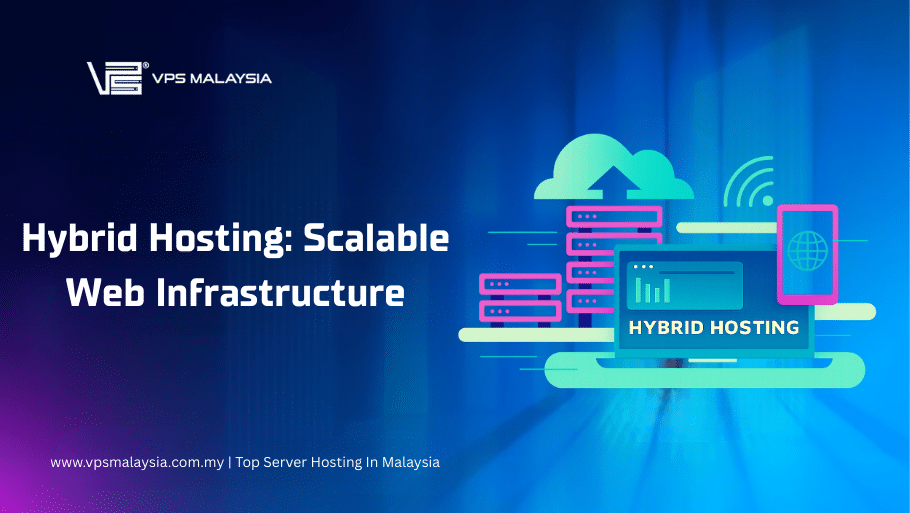1. Introduction
As businesses shift toward digital-first models, hosting needs are becoming more complex. Relying on a single hosting type often means making trade-offs between performance, scalability, and cost. This is where hybrid hosting comes in. By combining the strengths of multiple hosting solutions, such as cloud hosting, dedicated servers, and virtual private servers VPS Malaysia provides flexibility and resilience that traditional setups cannot match. For organizations running sensitive workloads, such as Forex VPS hosting, deploying applications on Windows VPS hosting or Linux VPS hosting, or managing enterprise-level workloads with dedicated servers, hybrid hosting from VPS Malaysia offers a future-proof way to scale operations without compromising performance.
This article examines what hybrid hosting is, its significance, and how it can enhance your business infrastructure.
2. What Is Hybrid Hosting?
Hybrid hosting is a strategy that blends different hosting environments to meet unique business requirements. Instead of relying solely on cloud, VPS, or dedicated servers, a hybrid model integrates them into one ecosystem.
- Cloud hosting provides elasticity and pay-as-you-grow scalability.
- Dedicated servers deliver uncompromising power and control for mission-critical tasks.
- VPS hosting bridges the gap with affordable performance and customizability.
The result is a balanced infrastructure that adapts to traffic spikes, security demands, and application-specific needs.
3. Why Hybrid Hosting Is the Future
A. Scalability Without Sacrifice
It lets businesses scale workloads to the cloud when needed while keeping sensitive data on a dedicated or VPS server.
B. Optimized Costs
Instead of overspending on dedicated hardware for all tasks, hybrid models allocate resources more efficiently.
C. Enhanced Security
Critical systems can remain on dedicated servers, while public-facing apps benefit from the flexibility of the cloud.
D. Performance Reliability
Forex traders, for example, can host trading platforms on VPS hosting for Forex, ensuring speed and uptime, while secondary services scale through cloud resources.
4. Comparing Hosting Options: Traditional vs. Hybrid
| Hosting Type | Key Strengths | Limitations | Best Use Cases |
| Shared Hosting | Low cost, beginner-friendly. | Limited performance and a lot of security risks. | Small personal websites or low-traffic blogs. |
| VPS Hosting | Balanced cost and performance, customizable. | Less scalable than the cloud. | Forex trading, small to medium business apps, and isolated environments. |
| Dedicated Server | Full control, robust power, security. | Higher cost, limited scalability. | Enterprise workloads, sensitive data, and large-scale databases. |
| Cloud Hosting | Elastic scalability, pay as you grow. | It can be costly with heavy usage. | E-commerce, global applications, seasonal traffic spikes. |
| Hybrid Hosting | Combines the benefits of all hosting types. | Requires advanced management. | Businesses need scalability, control, and resilience across applications. |
5. How Hybrid Hosting Supports Business Needs
A. For Forex Trading Platforms
- VPS hosting for Forex ensures low latency and consistent uptime.
- Hybrid setups allow backup and analytics to run on cloud servers while keeping trading applications on VPS.
B. For Windows-Based Applications
- Windows VPS hosting supports enterprise-grade applications.
- Hybrid hosting integrates cloud resources for testing and scaling while keeping critical apps isolated.
C. For Developers and Open Source Workloads
- Linux VPS hosting provides the flexibility needed for development environments.
- With hybrid models, developers can offload resource-heavy tasks to scalable cloud instances.
D. For Enterprise Infrastructure
- Dedicated server Malaysia setups deliver security and compliance for critical data.
- Hybrid hosting allows enterprises to use dedicated resources for sensitive operations while scaling customer-facing services with cloud hosting.
6. When to Consider Hybrid Hosting
You should explore it if your business faces any of the following challenges:
- Sudden traffic surges from marketing campaigns or product launches.
- Running both sensitive data systems and customer-facing apps.
- Need for predictable costs with room to scale.
- Performance-critical tasks such as Forex trading or enterprise applications.
7. Best Practices for Implementing Hybrid Hosting
A. Assess Your Workloads
Identify which applications need dedicated performance versus those that can flexibly scale.
B. Leverage Proxies and Load Balancers
Distribute traffic effectively across VPS, cloud, and dedicated environments.
C. Monitor Costs and Performance
Use monitoring tools to track resource usage and optimize spending.
D. Choose a Reliable Provider
Work with a hosting partner like VPS Malaysia that offers tailored VPS, cloud, and dedicated solutions under one umbrella.
8. Conclusion
Hybrid hosting is not just a trend; it’s the future of scalable infrastructure. By integrating Forex VPS hosting, Windows VPS hosting, Linux VPS hosting, and dedicated server solutions into one cohesive system, businesses can achieve a balance of speed, control, security, and scalability.
As 2025 approaches, organizations that adopt hybrid hosting will be better positioned to handle the demands of digital transformation and global competition. To explore hosting solutions tailored to your needs, contact us today to discuss how we can optimize your infrastructure.
9. Frequently Asked Questions (FAQ)
1. What makes hybrid hosting different from multi-cloud hosting?
It combines different types of hosting (VPS, dedicated, cloud), whereas multi-cloud specifically refers to using multiple cloud providers.
2. Is hybrid hosting suitable for small businesses?
Yes. Even small businesses can benefit from hybrid setups by hosting critical systems on VPS or dedicated servers, while utilizing cloud resources for scalability.
3. Can hybrid hosting improve website speed?
Absolutely. By assigning resource-heavy processes to the right environments, this hosting optimizes performance across applications.
4. How secure is hybrid hosting?
This hosting allows sensitive data to stay on dedicated or VPS servers, while cloud layers manage less critical processes. This layered approach enhances security.
5. Does hybrid hosting cost more?
Not necessarily. While it requires careful management, this hosting often reduces overall costs by aligning resources with specific needs.


Leave a Reply